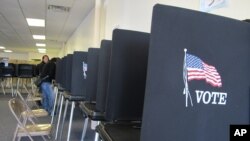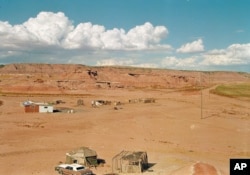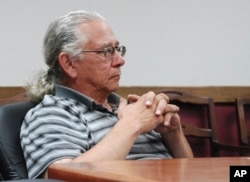When Americans go to the polls this November to elect the next U.S. president, Native American groups worry that many of their members will be turned away from the ballot box.
Native Americans won U.S. citizenship more than 90 years ago. Even so, many states denied them — as they did African Americans — the right to vote, subjecting them to poll taxes, literacy tests, harassment and intimidation.
In 1965, Congress passed the Voting Rights Act (VRA), banning such discriminatory practices and giving the federal government the authority to monitor elections to ensure they are fair.
In 2013, however, the Supreme Court defeated a key provision in the VRA. As a result, certain states with a history of racial discrimination are no longer required to get pre-clearance from the Federal government before they can make changes to election systems.
Soon afterwards, states began to change the rules. Some argued that they acted to prevent non-U.S. citizens from voting. But Native Americans and other minority groups complain the new policies discourage them from voting.
Kansas, for example, passed a law requiring voter registrants to provide proof-of-citizenship documents such as birth or naturalization certificates or passports. Voters have 90 days to produce the documents before the state will remove them from the rolls altogether.
Arizona, which is home to one of the largest Native American populations, in 2014 placed more than 500 registered Navajo voters on what it called a “suspense list” because they lacked proper street addresses. Indeed, as the Nation noted in 2012, Arizona’s voter registration form includes a large box on which Navajo voters can draw the location of their home in order to determine their precinct.
North Dakota, where Native Americans represent about five percent of the population, requires voters to present identification cards bearing their current residential address. Because many Natives don’t have ID cards or drivers licenses, they are disqualified from voting.
Long-distance voting
O.J. Semans, an Oglala Sioux, is co-executive director of Four Directions, a nonprofit that promotes Native voting rights across the country. Because his county is not “organized,” up until just a few years ago, he and other residents of the Rosebud Indian Reservation in South Dakota were forced to drive 60 miles to the next county to vote in elections.
“What you are looking at are individuals that have been consistently shown to be in the top 10 poorest counties in the whole United States,” Semans said. “You are looking at unemployment of 70 to 80 percent. And you are looking at one house, five families; three houses, one car. Never mind paying for the gas to get to the next county.”
South Dakota also allows registered voters to vote by mail, but Semans said even that is a hardship for Native Americans.
“If I wanted to vote absentee without going to the county office, I would write them a letter with an affidavit. I would have to find a notary to notarize my signature, saying that this was me,” said Semans. “Then I’d have to go to the post office and mail it, and sometimes, believe it or not, 49 cents for a stamp is kind of hard for some folks to come up with.”
Because many residents in Rosebud don’t have mailing addresses, mail delivery is sporadic, and the mail-in ballot may never arrive. And even if it does, tribal members may have a difficult time filling it out.
“A lot of our elders still speak our traditional language, and they don’t read or write that well,” said Seman. “And if they do manage to fill out the ballot, then they have to go to the post office to mail it back election authorities.”
So Semans’ and his colleagues negotiated with county commissioners, and ultimately convinced them to open up satellite voting offices on Rosebud and Pine Ridge Indian reservations.
It was a costly battle, he said, and in order to fund it, a local politician who consults with Four Directions sold off some of his cattle. Semans laughs uproariously at the memory.
“Fighting for the right to vote, we gotta send a white guy to sell his cows so we can get more money to keep going!” he said.
Language barriers
Despite many similar lawsuits across the U.S., states and counties continue to find creative ways to discourage Indians and other minorities from voting, said Laughlin McDonald, a lawyer with the ACLU’s Voting Rights Project who has argued many cases on behalf of Native Americans – most recently, Navajo Indians in San Juan County, Utah.
“Voting in that county was typically done in polling places on the Navajo reservation, but in 2014, the county shut down the polling places and adopted a system of mail-in voting,” said McDonald. “It would have taken Native voters four, five, even six hours to drive to the county seat.”
Furthermore, the VRA requires San Juan County, among other localities, to provide assistance to Navajos and other minorities who aren’t fluent in English.
“But in San Juan County, the mailing ballots are written only in English, and they don’t provide any way to explain those ballots to Indian voters,” said McDonald.
The county election commission refused requests to abolish the mail-in system, so the ACLU, the Navajo Human Rights Commission and eleven Navajo tribal members filed suit.
Meanwhile, in Washington, lawmakers have introduced two separate bills that would protect minorities from discriminatory election procedures, but both are stalled, to McDonald’s dismay.
“Congress needs to act,” said McDonald. “If you don’t participate in the political process you are not only denied the benefits of government but you become the victims of government.”






